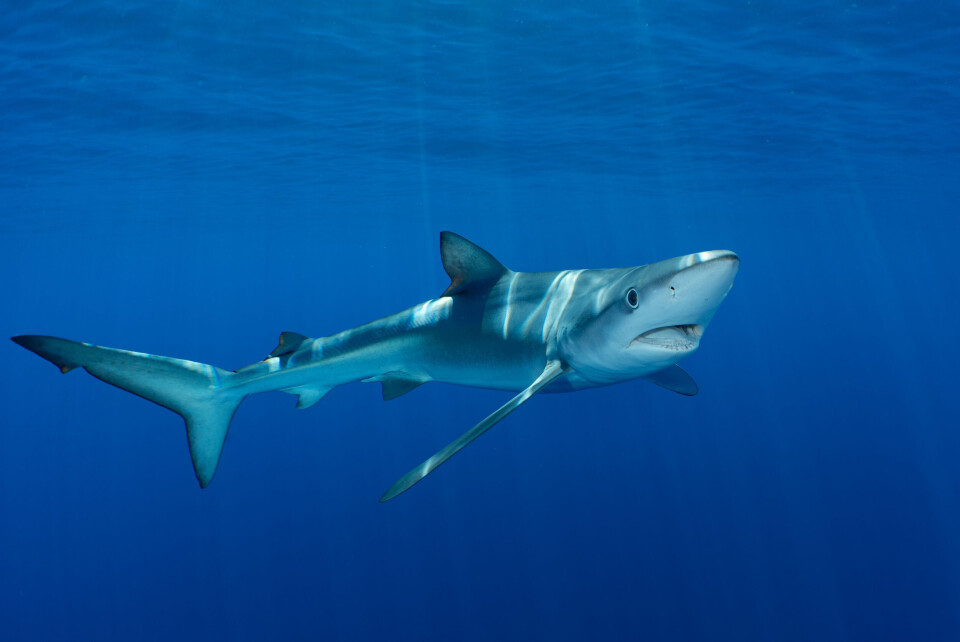-
La Voie Bleue: European Cycle Route of the Year is in France
700km bike path linking Luxembourg and Lyon has been crowned winner of the 2026 title
-
MAP: See how your location in France affects online food shop prices
New analysis shows how your shop compares on average
-
Further sightings of processionary caterpillars in France prompt action from local authorities
Caterpillars have arrived early after mild winter
Blue shark seen near south of France beach poses no risk say experts
The two-metre female is thought to have approached the coast to give birth

A two-metre blue shark has been spotted near a beach in southeast France but experts say there is no need for holiday-makers to be afraid.
The was seen on July 27 between the Almanarre beach in Hyères, and the Port Hélène beach in Hyères in the Var.
Marine biologist Nicolas Ziani said that the blue shark (Prionace glauca) was a female and added: “The images that were sent to us during the day confirmed that it is at least two metres long. We recommend keeping your distance for the safety of the animal so as not to stress it out.”
The shark is thought to have approached the area to give birth.
And while a shark may sound frightening, it is not unusual.
There are around several species of them in the Mediterranean and some come close to the coast on occasions.
Experts say there is no need to be alarmed. In a statement, emergency rescue service le Service Départemental d'Incendie et de secours du Var (SDIS), told FranceInfo: “A blue shark was seen this morning by someone on a paddleboard but the Almanarre beach was never closed.
Presence of a shark is not unusual
“We do not know where the shark has gone but we must emphasise that this presence is not unusual.”
Mr Ziani said: “This is the breeding period, the females come close to the coast to give birth. Usually, they take shelter from predators in coves, creeks, bays... But this one was not discreet.
“These sharks stay close to the surface because they are sensitive to the temperature of the water and sun [The water in the area is said to be 25C]. We see them in ports and calanques. They come to coastal waters to look for food and to give birth. We see them every summer in ports.
“The blue shark is opportunistic; it is attracted by food being thrown away.”
Blue sharks are not considered to be dangerous to humans. Most of the sharks in the Mediterranean never leave the deeper parts of the sea so the risk of coming into contact with one remains very low and the majority of the species in the water are not dangerous.
Mr Ziani said: “The only dangerous [species] is the great white shark, and that has almost disappeared. We sometimes see a few isolated ones in the Adriatic.”
The majority of shark sightings in the Mediterranean come in a small area between Sardinia, Tunisia, and Sicily.
Sharks are endangered
Sharks are actually endangered. A campaign to raise awareness was launched by the Longitude 181 association in 2002, and has been sharing information on the situation for the past 20 years.
Wildlife association the WWF has said: “Climate change and its impact on the marine ecosystem is also causing environmental changes that threaten the species by impacting the distribution of populations as well as those of their prey.
Read more: Worries over fish and ecosystem as Mediterranean sea set to reach 30C
“In the Mediterranean, 16 out of 32 species are at high risk of extinction, meaning half!”, it added.
And while sharks are often feared, partly due to the influence of Steven Spielberg’s 1975 film Jaws, there have been fewer than 100 attacks on humans in the Mediterranean since the Middle Ages.
“Five attacks have been recorded in France over this period," said Mr Ziani. “The most recent attack was in 1989 in Italian waters and it was during an underwater hunt. The shark was attracted by the signal sent by the fish in distress.”
Sharks are ‘timid’ and are afraid of humans
He added that sharks are usually more afraid of humans than we are of them and are “timid” creatures.
“They are not interested in humans, unless they are baited with fish that are bleeding into the water,” he added. “They are terminal predators, meaning they eat ill or dead animals. They are key regulators of other species. We must respect them.”
However, he said people should not approach sharks or try to touch it if they see one, to avoid putting the shark in a frightened, defensive state.
If you see a shark in the Mediterranean, you can report it to the Groupe Phocéen d'Etude des Requins / Phocean Shark Research Group, on its website here.
























